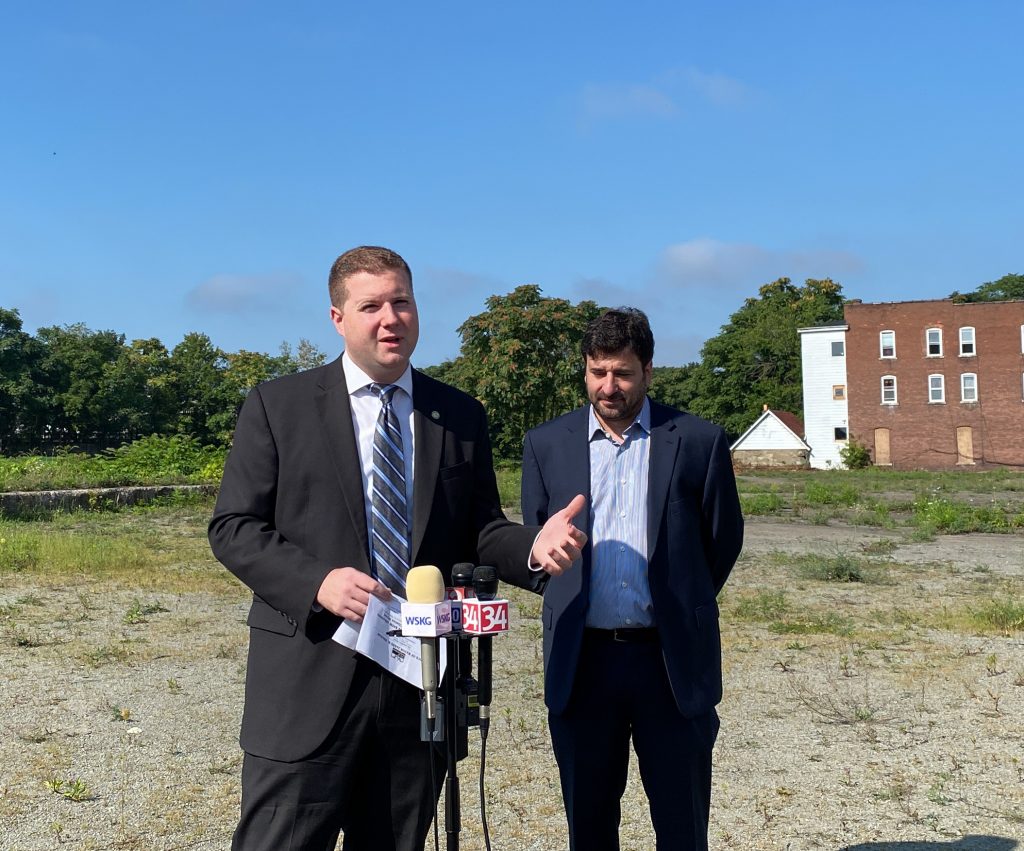In August 2022, Binghamton Mayor Jared Kraham announced a plan to revitalize Clinton Street in the City’s First Ward. Today, he announced plans for a $40 million affordable housing project.
Development of the 3.9-acre lot at 187 Clinton St., currently vacant after the demolition of a printing company and a Department of Motor Vehicles office, will be spearheaded by The Metro Group, a firm based on Long Island. The building will hold 102 units of affordable, workforce housing with commercial space on the ground floor. Construction is set to begin in 2025.
Support for the project has come from both local and state sources. According to a press release from the Mayor’s Office, $2.95 million was awarded from the Restore New York Communities Initiative — state funding for the positive transformation of “vacant, abandoned, condemned and surplus properties.” Kraham announced that the City would allocate $2.2 million from American Rescue Plan Act (ARPA) funds, which will need City Council approval.
At a press conference with Rob Muchnick, president of The Metro Group, Kraham tied the project to his vision for a revitalized city.
“Affordable housing is really critical to creating a thriving city,” Kraham said. “Families deserve safe, quality [and] affordable housing to raise their kids. Seniors deserve affordable housing, so they can retire with dignity.”
The apartments will serve families earning between 40-60 percent of the average median income — about $40,000-$60,000, according to Myles Monaghan, principal at Think City Partners — a partner to The Metro Group. Rents will start between $700-$1,000 per month, depending on unit type and the household size and income. The company is not currently planning on any market-rate apartments.
Kraham said that the project would apply for a Downtown Revitalization Initiative grant — which the neighboring Village of Johnson City recently won — from the state, describing Clinton Street as a future “Downtown 2.0.”
“Clinton Street has the bones and the infrastructure that many downtowns would kill for,” Kraham said.
Developers will seek a payment-in-lieu-of-taxes (PILOT) — a financial incentive for the private sector to invest in infrastructure for a public benefit — from the City. A recent PILOT measure pushed by the Mayor and passed by the City Council was rejected by the Binghamton City School Board, partly for a lack of affordable housing.
Aviva Friedman, ‘14 and a Working Families city councilmember, has called for ARPA funds to be used for responsible housing projects. A vocal opponent of the failed summer PILOT, she expressed hesitation at City funds going toward a for-profit, out-of-town development firm.
“We have used a lot of ARPA money on things that I do not believe are appropriate, varying from inappropriate to egregious, like misuse of money,” Friedman said. “My interpretation — I don’t yet have the hard numbers to back it up — but it seems like a [tax] break for a company that I assume is quite profitable. That doesn’t sit right with me.”
Adding that rentals were “extractive” compared to home ownership initiatives, Friedman also said that she wasn’t categorically anti-PILOT, though she would wait for more information from stakeholders before arriving at a decision.
David Muchnick, ‘23 and the son of the developer, recommended the Binghamton investment. He described the process of conceptualizing the project.
“Students coming up with their disposable income from downstate gentrifies the area,” Muchnick said. “Locals were being left behind, and there was a space for affordable housing.”



